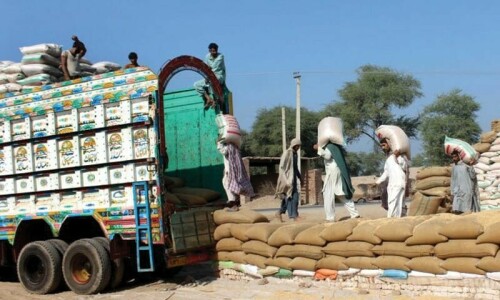LAHORE: The observance of 10-hour loadshedding for the industry has not only caused closure of many textile mills and other manufacturing units, but also rendered thousands of workers jobless in Punjab. The industry may lay off more staff if the outages continue, the millers warned.
Power distribution companies (Discos), including the Lahore Electric Supply Company (Lesco), were observing 10-hour loadshedding (6pm to 4am) daily for the industry after they decided to provide the prime users with uninterrupted electricity during Ramazan.
A couple of days before Ramazan, Lesco carried out test loadshedding on industrial feeders, and said it would not observe outages in industrial areas. But, it continued with the loadshedding.
“Since the first day of Ramazan, the entire industry, including textile mills, falling under B-3 connection/category or independent feeders is at the verge of destruction due to observance of 10-hour loadshedding daily,” claimed Mr Anisul Haq, secretary of the All Pakistan Textile Mills Association Punjab chapter. “The 300 textile mills in Punjab require only 1,000MW and the outages reveal that the government could not ensure adequate generation.”
In the prevailing scenario, many textile mills have eliminated two of the three eight-hour shifts with each shift comprising of 250 workers. Similarly, many other textile units have been closed for the ongoing month after their owners decided that switching from three shifts to one for eight to 10 hours may not work to meet export orders.
“The mills running on alternate energy sources (gas) other than electricity have also squeezed their shifts from three to one or closed the entire business after their owners decided that irrational gas tariff, which costs much more than electricity, cannot be viable to maintain cost of doing business.
“Imagine that you have no electricity, and gas has a much higher tariff than other provinces. Due to this situation, 200,000 people from all kinds of industry in Punjab are without a job,” Mr Haq claimed.
The jobless workers also criticised the 10-hour loadshedding for the industry. “It is amazing that the government is providing electricity to people at the cost of jobs,” Muhammad Aslam, a worker at a textile mill near Lahore, said.
Lesco claimed that the 10-hour loadshedding was being observed from the first day of Ramazan only for the industries that used other sources of energy besides electricity.
“The company is providing uninterrupted electricity to hundreds of paper, textile, plastic, glass, rerolling mills. These mills are included in the list of prime users since they have no other source of energy except electricity. Similarly, all domestic consumers also fall under this category. Every year in Ramazan, the prime users are preferred in terms of provision of electricity,” a Lesco spokesperson explained.
She said the company was unable to provide electricity to various industries -- textile, steel, Quaid-i-Azam Industrial Estate from 6pm to 4am since they had other sources of energy. “Our priority in Ramazan is the prime user alone,” she added.
Published in Dawn, June 2nd, 2018












































Dear visitor, the comments section is undergoing an overhaul and will return soon.